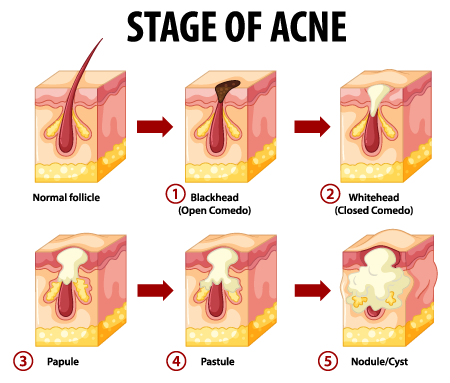Hey there! If you've ever battled with acne, you're not alone. It's a common skin condition that affects many of us, regardless of age or gender. But what exactly is acne, and how do we deal with it? Let's dive in and explore everything you need to know about this pesky skin issue.
What's Acne?
Acne, simply put, is when hair follicles get blocked with oil and dead skin cells, causing problems on your skin. This usually means you get pimples, blackheads, or whiteheads, and sometimes, more serious stuff like cysts or nodules.
Causes of Acne:
There are several factors that can contribute to the development of acne. Hormonal changes, particularly during puberty, can lead to increased oil production, which in turn can clog pores. Genetics also play a role, as acne tends to run in families. Additionally, certain medications, dietary factors, and lifestyle habits can exacerbate acne.
Understanding the Causes of Acne:
- Hormonal Changes: Fluctuations in hormone levels, particularly during puberty, can increase oil production, leading to clogged pores.
- Genetics: Family history plays a role in acne development, with certain genetic factors influencing susceptibility.
- Dietary Factors: Consumption of high-glycemic foods and dairy products may exacerbate acne in some individuals.
- Lifestyle Habits: Poor skincare practices, stress, and environmental factors can contribute to acne flare-ups.
Acne Common Symptoms:

Acne can show up in different ways, like:
- Whiteheads: Closed pores clogged with oil and dead skin cells.
- Blackheads: Open pores containing accumulated debris.
- Papules: Small, red bumps on the skin, often tender to touch.
- Pustules: Pimples with pus-filled tips.
- Nodules: Solid, painful lumps beneath the skin's surface.
- Cystic Lesions: Painful, pus-filled lumps under the skin.
These manifestations commonly affect the face, forehead, chest, upper back, and shoulders.
How Do You Know If You Have Acne?
Finding out if you have acne is usually easy. A doctor can tell just by looking at your skin. They might also ask about your health history and how you live to understand why you have acne.
Knowing When to Seek Medical Advice:
While self-care measures can alleviate mild acne, persistent or severe cases may necessitate professional evaluation. Consider consulting a primary care physician or dermatologist if:
- Self-care remedies fail to yield improvement.
- Acne worsens or persists despite efforts.
- Sudden onset of severe acne occurs, particularly in older adults, possibly indicating an underlying medical condition.
Special Considerations for Women:
Hormonal fluctuations often exacerbate acne in women, especially before menstruation. Contraceptives may help manage hormonal acne, but personalised treatment advice is recommended.
How Do You Treat Acne?
Over the Counter Treatments
Good news! There are lots of ways to treat acne that really work. You can use special creams or gels you can buy at the store that have ingredients like benzoyl peroxide or salicylic acid in them to help clear up your pores and make the redness go down.
Shop Over the Counter Acne Skincare
Prescription Treatments
If your acne is really bad, the doctor might give you stronger medicine to take by mouth, like antibiotics or retinoids, or they might suggest special treatments like laser therapy or chemical peels to help your skin get better.
Start A Consultation for Prescription Acne Treatments
In Conclusion
Dealing with acne can be a pain, but if you know what to do and get the right treatment, your skin can get better and look healthier. If you're struggling with acne, don't be afraid to talk to a doctor. Remember, lots of people go through this, and there are ways to make your skin look and feel better again.
FAQs About Acne:
How long does it take for acne to clear up?
- The duration varies from person to person and depends on the severity of the acne and the chosen treatment. Some may see improvements within weeks, while others may require several months of consistent treatment.
Can certain foods worsen acne?
- While individual responses may vary, some studies suggest that high-glycemic foods and dairy products may exacerbate acne in some people. It's essential to pay attention to how your diet affects your skin and make adjustments accordingly.
Is it okay to pop pimples?
- It's generally not recommended to pop pimples, as it can lead to inflammation, scarring, and potential infection. It's best to let acne heal naturally or seek professional treatment from a dermatologist.
Can stress cause acne?
- Stress can trigger hormonal changes in the body, leading to increased oil production and, consequently, acne flare-ups. Practicing stress-reduction techniques such as exercise, meditation, and adequate sleep may help manage acne.
Are there any natural remedies for acne?
- While some natural remedies like tea tree oil or aloe vera may offer mild benefits for acne, they may not be as effective as medical treatments. It's essential to consult with a dermatologist before trying any home remedies to ensure they're safe and suitable for your skin type.
Related Reading
Your Ultimate Guide to Skincare Routines for Acne-Prone Skin
The Surprising Link Between Diet and Acne







